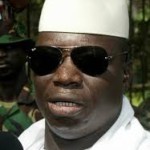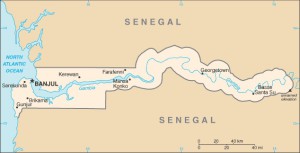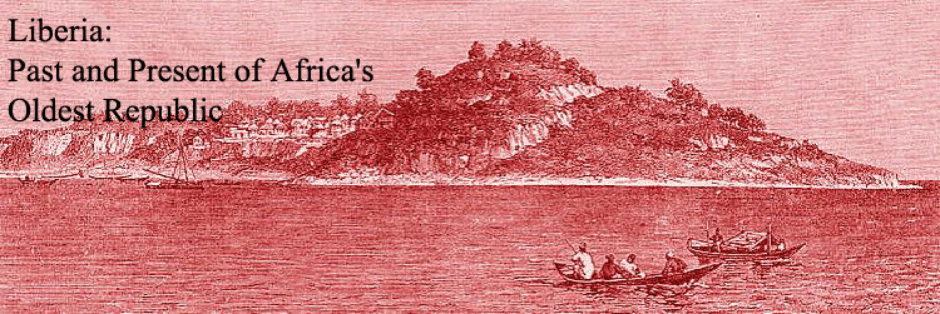 The decision of President Yahya Abdul-Aziz Jemus Junkung Jammeh Babili Mansa, the despotic ruler of the Gambia, not to accept the outcome of the December 1 presidential elections – contrary to his earlier congratulations to his opponent, the winner, Adama Barrow – took everybody by surprise. His erratic behavior only increased over the 22 years that he has been in power, after staging a succesful military coup in 1994. Gambia has up till now known only two presidents (since independence in 1965): Sir Dawda Diawara, who was deposed in 1994, and Jammeh. Why did Jammeh first concede and then reversed? Was it his fear of being prosecuted for the heinous crimes committed since ruling over this mini-state? Gambia forms an enclave in Senegal on both sides of the Gambia river, its width determined by the reach of a cannon. A more striking example of the crazy borders colonialism left on Africa is hardly thinkable.
The decision of President Yahya Abdul-Aziz Jemus Junkung Jammeh Babili Mansa, the despotic ruler of the Gambia, not to accept the outcome of the December 1 presidential elections – contrary to his earlier congratulations to his opponent, the winner, Adama Barrow – took everybody by surprise. His erratic behavior only increased over the 22 years that he has been in power, after staging a succesful military coup in 1994. Gambia has up till now known only two presidents (since independence in 1965): Sir Dawda Diawara, who was deposed in 1994, and Jammeh. Why did Jammeh first concede and then reversed? Was it his fear of being prosecuted for the heinous crimes committed since ruling over this mini-state? Gambia forms an enclave in Senegal on both sides of the Gambia river, its width determined by the reach of a cannon. A more striking example of the crazy borders colonialism left on Africa is hardly thinkable.
 But I won’t speak here about colonialism and its aftermath. Besides, it’s over half a century that most colonies were decolonized. I want to focus here on the rule of law in a number of African countries and the impunity that some perpetrators of war crimes, human rights violations, and outright murderers still enjoy. Today, the Chair of ECOWAS, Liberia’s President Ellen Johnson Sirleaf heads a mission to Banjul to persuade President Jammeh to give up and accept a democratically elected successor. A laudable mission, let me be unequivocally clear about that. For too long African organizations have remained silent after the worst atrocities took place in member states. But it is still good to draw attention to the home-countries of these presidents who plead for democracy and an end to lawless behaviour in other countries. In President Sirleaf’s home country, Liberia, not a single warlord has been prosecuted after the civil war ended in 2003, already 13 years ago. Ellen Johnson Sirleaf takes credit for winning democratically the presidential elections of 2006, thus becoming the first democratically elected female African president. A historic achievement. Unfortunately, the victims of the civil war that she helped starting still wait for justice. Each and everyday they are confronted in the streets of Monrovia or in their villages with the murderers of their relatives and the rapists of their daughters and wives.
But I won’t speak here about colonialism and its aftermath. Besides, it’s over half a century that most colonies were decolonized. I want to focus here on the rule of law in a number of African countries and the impunity that some perpetrators of war crimes, human rights violations, and outright murderers still enjoy. Today, the Chair of ECOWAS, Liberia’s President Ellen Johnson Sirleaf heads a mission to Banjul to persuade President Jammeh to give up and accept a democratically elected successor. A laudable mission, let me be unequivocally clear about that. For too long African organizations have remained silent after the worst atrocities took place in member states. But it is still good to draw attention to the home-countries of these presidents who plead for democracy and an end to lawless behaviour in other countries. In President Sirleaf’s home country, Liberia, not a single warlord has been prosecuted after the civil war ended in 2003, already 13 years ago. Ellen Johnson Sirleaf takes credit for winning democratically the presidential elections of 2006, thus becoming the first democratically elected female African president. A historic achievement. Unfortunately, the victims of the civil war that she helped starting still wait for justice. Each and everyday they are confronted in the streets of Monrovia or in their villages with the murderers of their relatives and the rapists of their daughters and wives.
Another member of today’s ECOWAS mission to Banjul is President Muhammadu Buhari, since 2015 president of Nigeria. This time he was democratically elected. Buhari also was president of Africa’s most populous country from 1983 till 1985. In 1983 he had staged a military coup that overthrew a democratically elected president. Human rights abuses were rife during Buhari’s rule over Nigeria. In 1984, he issued the ‘Protection Against False Accusations Decree’ , still considered by many as the most repressive press law ever enacted in Nigeria. In 1985 Buhari was deposed in another military coup but he never accounted for the misdeeds he and his associates committed during their tenure of power.
In 2014, President Blaise Compaoré of Burkina Faso was forced to flee following a popular uprising against his 27-year rule of the country. He thus escaped a popular verdict and a trial. He is generally believed to have masterminded the assassination of his friend, President Thomas Sankara, in 1987. Two years later, the Burkinabe journalist Norbert Zongo and three comrades were assassinated. Norbert Zongo had been investigating the mysterious death of the driver of François Compaoré, Blaise’s brother. Blaise Compaoré fled to Ivory Coast in October 2014. The president of this country, Alassane Ouattara, partly of Burkinabe descent, granted him asylum and the Ivorian nationality, thus making extradition to the new democratically elected government of Burkina Faso, who want to put the former dictator on trial, virtually impossible.
I could go on, with other examples of impunity – both in the region and in other parts of Africa – but I think I have made my point clear. The establishment of the rule of law and the end to impunty still have a a long way to go in Africa. Before ending here, however, I want to mention three important trials that may indicate that a new era has already started in Africa.
In May 2016, the former ruler of Chad, Hissein Habré (1982-1990) was found guilty of human rights abuses – including rape, sexual slavery and ordering the killing of 40,000 people – and sentenced to life in prison by a Special Tribunal in Senegal, an African-Union backed court. Habré thus became the first former African Head of State who was convicted for human rights abuses in the court of another nation (Senegal).
In another trial that captured the international attention, former Liberian president Charles Taylor was convicted for war crimes and aiding and abetting rebels in neighbouring Sierra Leone (2013). He was sentenced to 50 years in jail by the Special Court for Sierra Leone and is now spending the last years of his life – hopefully – in a maximum security prison in the UK.
A few weeks ago the trial of the leader of the 2012 military coup in Mali that deposed a democratically elected government started in Sikasso, a southern city in Mali. Former coup leader general Amadou Sanogo and 17 co-defendents are accused of murdering 21 ‘Red Berets’ , suspected of staging a counter-coup. The ‘Red Berets’ trial is an encouraging step forward towards more justice in Mali. However, still a lot more needs to be done. The 2012 coup by Sanogo and his comrades (‘Green Berets’) triggered many more atrocities committed by Tuareg secessionists, other warring factions including the Malian Army, jihadists, terrorists, smugglers and other ordinary criminals. Foreign troops, notably the French, operate with a ‘license to kill’ in the country and kill suspected terrorists without any procedure or trial.
Now, back to the Gambia and president Jammeh. I sincerely hope that democracy and justice will win in the Gambia and that Jammeh will have to give up power, that he will accept a peaceful transition to a democratically elected successor, and that he will soon face an independent court in Africa to account for the 22 years he ruled with an iron fist over this tiny country of about 2 million people. May his trial be symbolic for the end to impunity in Africa and scare all who have escaped justice so far.
